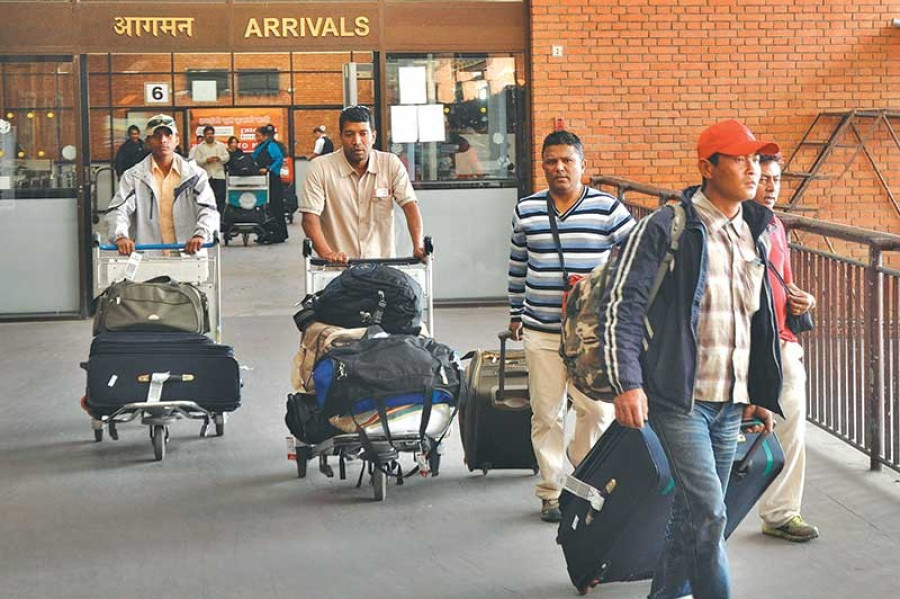National
Nepali migrant workers returning home from labour destination countries without wages
Sluggish investigation by the government agencies is derailing their access to justice and payment of salary arrears.
Chandan Kumar Mandal
After working in various states of India for nearly a decade, when Nabin Kumar Yadav returned to his village—Tirhut Rural Municipality, Saptari—he found himself jobless. Like many of his fellow villagers, he was left with no option other than to seek employment in the Gulf region.
With the help of a local sub-agent, Yadav secured a heavy vehicle driver’s job in a transport company in Dammam, Saudi Arabia.
According to Yadav, he paid Rs110,000 to the recruiting agency for the job. He thought the job was worth investing in because it promised him a monthly salary of 1,800 Saudi riyals, besides payment of overtime hours and free accommodation.
Within a month of landing in Saudi Arabia, Yadav obtained a driving licence, but the job remained elusive. The company that had hired him gave him a meagre 50 Saudi riyals per week for food expenses.
“The recruiting agency had told me that my salary will begin from the moment I landed at the Saudi Airport,” says Yadav, ruefully. “There, initially, I was surviving on 50 riyals per week. Then, the payment went down to 50 riyals every two weeks and later, got further reduced to 50 riyals once a month. I needed at least 10 riyals for one-time food.”
When Yadav was finally given a vehicle to drive after three months of his arrival, he was given a meagre 240 riyals for his three months’ service. Although he was a heavy driver and was traveling across Saudi Arabia almost all the time, he was never paid overtime.
“The company told me that the rest of my salary was deducted as an investment for my job. They told me that since it was a ‘free visa and free ticket’ job, they had to take care of my expenses. But, I had paid a huge amount to the recruiting agency,” Yadav lamented.
Time passed but the payments remained low and irregular for Yadav. He frequently contacted the World Link Human Resource Solutions Pvt. Ltd.—the recruiting agency back in Nepal—for retrieving his due salaries from the employer.
But all he could get from the recruiting company was failed promises of recovery of his salary arrears. After spending 15 months, the recruiting agency brought him back to Nepal.
“I had gone to work and earn some money for my family. But I had to return midway, empty-handed,” Yadav told the Post from his village in Saptari.
In his 15-months of working for the company, Yadav only received a total of 2,150 Saudi riyals—which was not even equivalent to two months’ salary promised in the contract.
Yadav is among hundreds of Nepali workers who return back empty-handed after working in labour destination countries in the Gulf region and Malaysia.
Every year, a large number of Nepali migrant workers return home after not being paid or facing other forms of exploitation from their employers. Even if they manage to escape from their exploitative conditions in countries where they reached after making huge personal investments, they are never paid their dues after they return to Nepal.
Suresh Kunwar, who hails from Dhurkot Rural Municipality of Gulmi, was among the 150 odd Nepali workers who were stranded in Kuwait without food or money for more than six months in 2017.
Following a financial crisis, his company—Kharafi National—had not paid salaries to its workers, for months. After the Nepal Embassy intervened, most of them were repatriated, but without being paid their dues. The company owed some workers as much as nine months' salary.
“The embassy had assured that they would collect their dues from the company and send us the amount,” said Kunwar, who is yet to receive more than Rs100,000 from the company. “It’s been nearly two years now. I am still waiting for my hard-earned money.”
As per the existing Nepal laws, if any worker faces any form of exploitation in a foreign land like lesser salary or facilities than what was stated in their labour contract or if the worker requires immediate rescue and repatriation, the recruiting agencies should be held accountable for their predicament.
The problem of workers returning without being paid and breach of contract is so rampant that there is a whole section at the Department of Foreign Employment dealing with the issue, says Bhola Nath Guragain, the department’s spokesperson.
“There are frequent cases of workers not getting paid as per their contract and those who have been left stranded in a foreign country,” said Guragain. “Following such complaints, we take action against recruiting agencies and make them compensate the workers.”
When Yadav returned from Saudi Arabia, the company owed him more than Rs1.3 million. Like hundreds of other cheated workers every year, Yadav also filed a complaint against the recruiting agency at the department.
But, sadly, nothing has happened since he filed the case a year ago.
“I have already visited the department five-six times to follow up on my case,” said Yadav. “But I have kept being told that they are investigating the case.”
According to Yadav, his complaint file had once gone missing from the department and only after an inquiry he could retrieve it on the computer.
“The department has blacklisted the recruiting agency. I was told that I will be compensated from the guarantee amount recruiting agencies deposit for the licence,” said Yadav.
He is waiting, in hope.
Every day, hundreds of cheated migrant workers are seen frequenting the department for seeking compensation or action against the sub-agents and recruiting agencies. The sluggish progress in dealing with such complaints only worsens the condition of workers who have already been under grave financial and mental stress.
“Migrant workers file cases at the department believing that their concerns will be addressed. Sometimes, the investigation takes time looking into the nature of the case,” said Guragain. “We have to consult our foreign missions which then investigate the matter in the respective countries. The department cannot merely rely on the statement and documents of the victims.”
When a group of Nepali women migrant workers were repatriated from China after being duped by their recruiting agency, they returned home, empty-handed. Their ordeal for receiving compensation has continued since.
Recently, Amnesty International, the human rights body, in its study revealed that thousands of migrant workers are returning without salary and justice from Qatar. Qatar remains one of the most preferred labour destination countries.
Waiting for justice after repatriation looks endless for migrant workers like Yadav who now has started doing some irregular jobs to provide for his family and pay back the loan he took from a moneylender for landing the job in Saudi Arabia.
“If they cannot compensate the whole Rs1.3 million, they can deduct the money I was paid in Saudi Arabia,” said Yadav. “But I need the money at any cost. The loan of Rs100,000 has now become Rs300,000. The moneylender will not wait forever.”




 22.16°C Kathmandu
22.16°C Kathmandu














